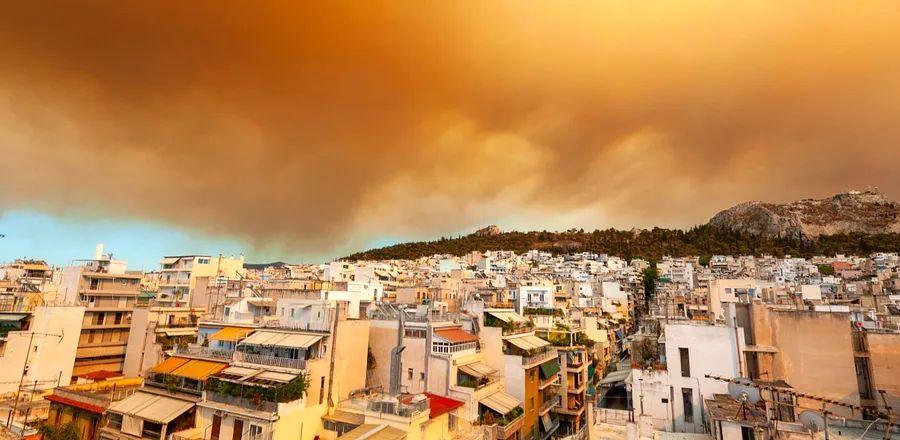A Wildfire Near Athens Prompted Evacuations This Week: Here’s How to Stay Safe in Greece

On Monday, August 12, travelers in Athens witnessed a dense cloud of smoke and ash rising over the Acropolis due to a significant wildfire that raged 24 miles northeast of the Greek capital.
Now under control as of Wednesday morning, Greece's most severe wildfire this year resulted in one fatality, left numerous people injured—including firefighters, scorched approximately 124,710 acres, and damaged or destroyed around 100 homes and businesses.
Hundreds of firefighters and volunteers, supported by additional European forces, worked tirelessly to control the intense blaze, which was fueled by strong winds that sent flames soaring up to 80 feet high. The fire rapidly spread through the parched woodlands of Mount Pendeli and into the verdant suburbs of northern Athens.
Thousands of residents, stunned by the proximity of the fire, were forced to evacuate their homes. Animal welfare organizations aided in the rescue of numerous pets and animals. The Hellenic Federation of Hotels quickly responded by providing temporary housing for 649 individuals in 39 hotels, according to state broadcaster ERT.
With temperatures in Athens expected to soar to 100.4 F (38 C) on Thursday and Friday, authorities are on high alert to quickly respond to any flare-ups. The fire ignited on Sunday in Varnavas, northeast of Athens, near the historic town of Marathon, affecting suburbs such as Dionysos, Vrilissia, and Halandri. Investigations are underway to determine the fire's cause, which is thought to have originated in a field in Varnavas. Kostas Tsigas, head of the firefighters’ association, remarked to Greek media that it was “likely the toughest fire of the past 20 years,” noting that humans are responsible for 99 percent of fires, whether ignited intentionally or through negligence.
What’s Behind the Surge in Wildfires in Greece?
Since April, hundreds of wildfires have erupted in Greece, even before the official fire season began in May. This summer, blazes have impacted the islands of Evia, Chios, Kos, and Crete, as well as Thessaloniki and other regions. In early July, a fire on Kos prompted the evacuation of 10,000 residents and tourists.
Experts attribute the increasing frequency and severity of wildfires to hotter and drier weather conditions across Europe, the fastest warming continent, linked to the human-induced climate crisis. Greece is facing its hottest summer on record, with an unprecedented heat wave hitting in early June.
Athens, along with much of the country, has seen above-average temperatures and minimal rainfall, leaving its forested areas particularly susceptible to fires. Over the last eight years, wildfires have devastated 37 percent of the forests in greater Athens, according to the National Observatory.
The Impact of Greece’s Wildfires on Local Resources
In late July, islands such as Leros, Sifnos, and portions of Crete and Kefalonia, which welcome millions of summer visitors, declared states of emergency due to water shortages. Reservoirs and underground water supplies suffered from an unusually warm winter. The influx of tourists has intensified the situation, prompting authorities to explore solutions like temporary seawater desalination plants. The rapid expansion of hotel developments in recent years has also strained water resources, especially with the added demand from swimming pools.
I’m considering a trip to Greece soon. Should I still go?
Christos Stergiou, CEO and founder of the luxury travel company True Trips, expressed to Dinogo that it's understandable for tourists in Athens or on the islands with flights back to Athens to feel concerned.
“We are all deeply saddened by what has occurred,” he noted, referencing Greece’s deadliest wildfire in 2018, which claimed 104 lives east of Athens. “I believe many lessons learned from that tragedy have helped the country establish additional safety measures, including the 112 emergency phone number,” he said. “For instance, one fire came alarmingly close to my parents’ home at one point, but it was contained within minutes thanks to the presence of fire-detecting drones, along with helicopters and planes. Additionally, the fire department is strategically deployed in regions during days forecasted for extreme heat and winds.”
The Greek government has utilized new technology to enhance fire response measures, aiming to help citizens feel “a little bit safer,” according to Stergiou. He remarked, “Fires occur in the U.S., Australia, Greece, and many other nations. Sadly, I believe this is the new normal.”
How can I ensure my safety while in Greece?
As of this writing, Greece is not facing any significant wildfires. In the event of an emergency like a fire, residents and visitors in affected areas receive alerts on their phones, including in English, through the EU-wide 112 emergency phone number, which advises them to relocate to safe zones well in advance.
Stergiou mentioned that while some travelers may receive 112 alerts, they might struggle to understand the specific boundaries of fire-affected regions. “In such cases, consult your travel advisor, your hotel host, or local authorities. Residents are usually eager to assist you,” he advised.
Open fires are strictly forbidden during Greece's fire season, which runs until the end of October. In late June, fireworks from a privately chartered yacht near Hydra ignited 300 acres of forest. If you spot a fire or someone igniting one, contact the fire service at 199. For emergency assistance, call 112.
How can I contribute positively?
Regardless of whether you're in a hotel, an Airbnb, or staying with a friend, be conscious of your water consumption. Opt for quick showers, reuse bathroom towels and sheets, and turn off the air conditioning when you’re out to help lower greenhouse gas emissions.
Evaluation :
5/5



